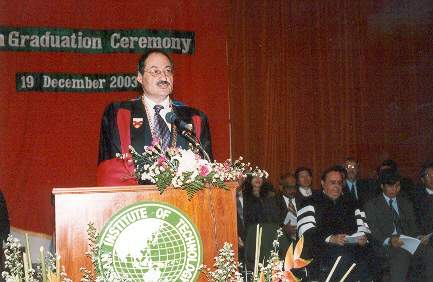
Prof. Jean-Louis Armand, President delivers the welcome address.
AIT's 99th Graduation
On December 19, 2003, AIT held the 99th Graduation Ceremony to 221 students from 22 countries at the AIT Conference Center. Prof. Jean-Louis Armand, AIT President presided over the ceremony.
Among the 221 graduates, 138 are from the School of Advanced Technologies, 38 from the School of Environment, Resources and Development, three from the School of Civil Engineering, and 42 from the School of Management. There were 24 doctoral graduates 196 master's graduates and one diploma.
The total number of AIT alumni now stands at 12,729, with the largest number of 3,334 coming from Thailand.
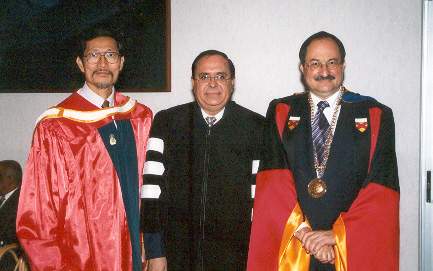
From left: Prof. Gothom Arya, Registrar; H.E. Prof. Dr. Atta-ur-Rahman and Prof. Jean-Louis Armand, President.
To mark the 99th Graduation Day, H.E. Prof. Dr. Atta-ur-Rahman, Federal Minister of Science and Technology, and Chairman of Higher Education Commission, Government of Pakistan, delivered the Graduation Address to all graduates.
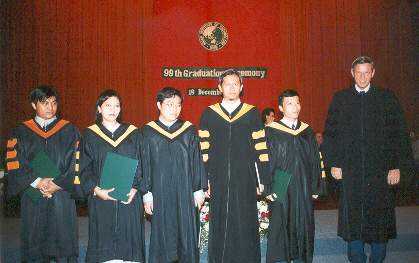
Above and below: Scenes at the 99th Graduation ceremony
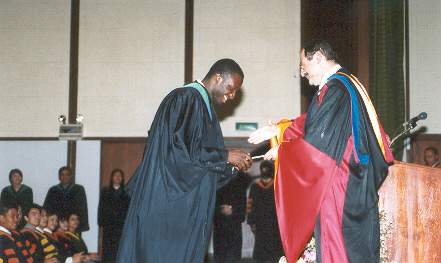
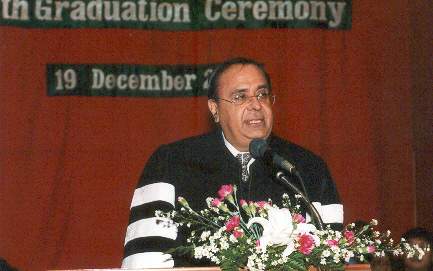
H.E. Prof. Dr. Atta-ur-Rahman, Federal Minister of Science and Technology, and Chairman of Higher Education Commission, Government of Pakistan, delivers the Graduation Address
Graduation Address
Mr. President, Honorable Ambassador of Pakistan, Honorable Ambassador of Vietnam, Excellencies, AIT Trustees, Faculty Members, Graduands, Alumni, Ladies and Gentlemen
Good morning. It's a matter of privilege and a pleasure for me to be here this morning and I am greatly honored by this invitation. Let me start by congratulating all the students who are getting these awards, these degrees, at this wonderful event. I know it's going to be a very memorable event and as you go through life, you'll look back at it as a milestone in your life time. So my heart is congratulations to you, to your parents, and of course to the faculty members who are responsible for working so hard in training you during the last few years.
Ladies and Gentlemen, we live in an age now which is knowledge-driven. Knowledge has become the key driver for socio-economic development, especially in the last few decades. It is no longer important of oil, or gold, or minerals your nations have. What is far more important is the challenging educational systems which nations have been able to set up and their ability to unleash the creativity which all of us possess and our ability to retain our brightest within our own shores so that they can contribute to the development of our respective nations. That is the challenge that we have. And when we look at the GDPs of various countries, we see that even small countries are forging ahead. Those countries which have realized that this should be the vision for their development. For instance, a small country like Austria which has the population of only 8 million has the GDP of over 210 billion dollars. A country like Finland with the population of only 1.5 million just one company, Nokia, had sales of over 26 billion dollars last year. And this is the road to social economic development and to the alleviation of poverty --investment in human resources and investment in knowledge. And I am delighted that in Thailand you have this wonderful center, the Asian Institute of Technology, which is known worldwide for its excellence and it has been a pleasure, sir, to develop stronger cooperation with this institute with which Pakistan has been involved right from the very beginning and I look forward to growing strengthening between Pakistan and the Asian Institute of Technology in the years to come.
We live in a strange and a rather magical world where truth is really becoming stranger than fiction. In many of our lives, we have seen man venture into space and to put the first steps of mankind on the moon. And the space is now proving to be one of the great mysteries of the universe -- this expanding universe. Many of us think that space is empty. Not true, it's bubbling with energy, bubbling with particles. Energy so strong. It's stronger than the gravitation pulled between the various planets and solar systems and galaxies. And it is this energy in fact which is driving the planets and the galaxies apart in this expanding universe. In fact, we can only discern about 10% of matter in the universe and one of the great mysteries is the dark matter that we don't understand and there is a hypothesis that there are new cholinos which are responsible. Last week, I was at Lucerne and Geneva where indeed the worldwide web was born and there they have one of the wonders of the world, a long tunnel, some 30 kilometers or so long about a 100 meter deep underground where the x-rayed particles to near the speed of light and collide them. And they are now refurbishing this whole experiment which will now become operational in 2007 where proton and anti protons will be accelerated to speeds near the speed of light. And from the resulting collisions, one will try to understand what happened in that first one trillionth of a trillion of a second after the big bang. How the universe was formed and what are those fundamental building blocks which constitute the universe. The search for the illusive higs goes on that one frontier. We have also seen information technology come in a very big way, transforming the globe into a genuine global village. Just three companies in the United States have sales of over 100 million dollars daily exclusively on the internet. And by the end of next year, it is predicted that over 1400 billion dollars of commerce will be done purely electronically, constituting somewhere around 8-10% of the total world commerce. We have seen also the advent of biotechnology, starting from a small paper published about 50 years ago by
Watson and Crick from Cambridge in which they described the structure of the DNA and the double hierarchylical structure which underlines the code on the basis of which all of us are constituted. Culminating about two years ago in the raveling of the sequence of the human genome, the two and a half billion also, letters of the alphabet, the software that nature God has laid within all of us. And these are four letters and it is a manner in which these letters. They are actually chemical molecules but I don't want to give you a chemistry lecture. So, these are four letters of the alphabet and some manner in which these four letters are raised that determine your height, how your brain functions, how your heart is going to be, whether your nose will be one inch long and not one foot long etc. Wonderful. Another wonderful horizon. And through understanding of the gene and its effect on protein synthesis, we are getting information about phenomena such as aging, about cancer, about genetic diseases, about epopthoses is program cell deck, a cell goes to a life cycle and at a certain time there is a message that goes and says it's time to die. What are those messages and can we interfere with those messages to prolong life. These are the fantastic horizons of science and this really makes science, as I said, truth stranger and fiction. And you the students have begun a long and very exciting journey and what we need to understand about all these that acquisition of knowledge and that science is fun. That something that you need to understand and above all research is fun. And extending the barriers of knowledge, they can be no greater pleasure than the pleasure of discovery and the pleasure of transferring knowledge to others around you. That is what life is really all about. And so in biotechnology, we see now strange things happening. Bacterial genes which can make vitamin A being incorporated into rice or wheat to eliminate night blindness in children. We see salt-tolerant genes being discovered and then being transplanted into crops. We see the advent of BT crops bacillus thorigeenses which is a natural pesticide to be releasing organism. Some of those genes being transferred into cotton and into other plants so that there is natural resistance. We see potatoes being made which have edible vaccines built into them. And we see electricity being produced from vegetables. A part of the electricity of Amsterdam is produced from vegetable wastes which are transformed by a micro organism secromysis serviceae here into methane which is then burnt to drive electricity turbines. And we see the advent also of material sciences. The advent of nano technology and nano science. The behavior of matter changes if the particle are ground to a very fine size. And this is now leading to the development of new materials, development of new pharmaceuticals, new cosmetics, even new types of computer systems. All that through material sciences and intelligent materials are now being designed. So, before long you will have cars and you have an accident, the car body will remember its original shape and you don't have to go to a denter. The shape will revert back automatically. So, strange and wonderful world of science. And the area of renewed energy, we find the advent of high region cells where water is going to be the key source of energy and not petroleum. In fact, through a process recently discovered that you can use sunlight to cleave the water molecule into hydrogen and oxygen using certain catalysts and then the hydrogen generated is then burnt to create the energy to drive a whole range of different things including vehicles. And we are also now on the verge of another horizon, fusion technology. What is happening in the stars. Can we use that technology for producing energy. And indeed, five or ten or15 years from now, it may be that fusion is ultimately the answer for all the energy requirement.
In Pakistan, we have for the last few years, starting putting major effort in science. President P. Musharaf invited me to take over as a Federal Minister of Science and Technology about three years ago. I asked him just one question - Sir, are you serious, very serious about science? And the President said of course I am serious. Why do you ask that question? I said 'Sir if you are serious, your seriousness must be reflected in the budget reallocation for science and technology. And the result, ladies and gentlemen, would you believe it. I think we should go to the Guinness book of records for what happened. A 6000% increase in the budget for science and technology of Pakistan. For the first time in the history of my country, money was not a bottleneck anymore. If you good programs and good projects, the funding was there and a lot of really exciting things have begun to happen. For instance, we have placed the satellites in space and four new television channels will start up soon exclusively for education. All the universities are being connected up with fiber and this should be completed within the next two months so that lectures given 2000 kilometers away in one part of the country can be listened to in another part of the country and we can share the faculty. With the satellite, we are linking ourselves up to Stanford, MIT, and Harvard and other top places so that we can have lectures delivered by top people from the west and listened to by university students and faculty members in Pakistan. And perhaps most exciting of all, a huge digital library is being into place. Eleven and a half thousand journals, full text online, will be accessible to the entire country free of charge to all faculty members by the end of next month. So these are all important happenings and all these will hopefully prepare our country into the future. We are also have a program to hire people back from abroad, a foreign faculty hiring program and I said the salary structures of teachers, of researchers, must be such that our young people opt for science. We have changed the salary structures. Now, in Pakistan, the salary that a professor would be getting would be four times the salary of the Federal Minister like myself. This I think is another important milestone.
I would like to end, dear students by saying that -- remember that this is just the beginning. You have a long and hopefully illustrious road ahead of you. Learn to give and not just to take. Learn the joy of learning and as I said 'spreading knowledge'. Learn the fun that lies in scientific research. And be caring for the human beings is important to build bridges across the world and there can be no better bridge building than through knowledge and through science. Ultimately, we are part of the same community-a community which is in the eternal search for truth and pray to God for your success in the years to come. And remember, to smile, work hard, but don't lose your sense of humor. It's important to maintain an appropriate attitude and it's wonderful that you have a President with the wonderful sense of humor. We had some excellent jokes last night. Let me now therefore end by a little story which I also said last night to a dinner and this applies to you. As you look across space, you look across time also. And you see different galaxies and these galaxies go through certain life cycles. And at the huge temperature and gravitational pulls that exist within the white dwarfs, elements are born. Hydrogen, nuclear fuse, helium, lithium, brilium, boron, and carbon and nickel and gold and what have you, all these are born within these stars and these stars then explode, the super nova explosion and this matter is dispersed into the universe and ultimately they reconglomolate in you, in me. So every single atom within your body, dear students, was once in the center of the burning star. So we are all made of stardust. Now it is our duty to let that stardust shine and let the knowledge illuminate the world around us.
